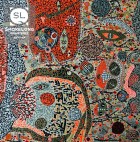I love second-person narration, and I have lots of ideas about when and why to use it. Why did you choose second-person narration for this story?
I’d love to hear your ideas. My take here is this story invites a certain level of reader engagement. The invitation is both urgent and somewhat gradual. First you step into a room. Then you look around. Then you take in its strangeness. Then ….
I also tried writing this in first person. I didn’t try third person, as I discovered halfway through writing a draft in first person that the narrator really wanted to tell the story by saying, “You did this, you did that … etc.”
Finally, a wise teacher once told me second person often speaks for someone whose ego is a bit out of control. I think this is true here in the sense that she is so consumed by something, she can’t see herself clearly. And perhaps true to people her age, she thinks it is up to her and only her to deal with these issues.
One of the lines that made me really sad is this one: “Don’t make trouble, your father had said while packing and repacking for your flight. Or did the manager whisper it in your ears ….” This story has quite a few men—the narrator’s father, and her first employer—who give Jian that “advice” that is oh-so-familiar to women. What are they telling her (or, to pick up that great, shocking final paragraph, force-feeding her)? Why did you align her father with these other problematic men?
Each has failed her in some way; but she also holds each with some level of respect or love or sympathy. As you mentioned, the line above overlaps the two men’s words and makes it more difficult for her to treat the event for what it is. Perhaps on a better day she wouldn’t have be so confused but that moment has her pushed into a corner, so to speak.
Beyond this, the line also suggests that the world in which she grew up may have valued “conformity to norms” more than individuality. This background further checks her instincts to fight back.
This line also killed me: “You wish you could say you were outraged. And fought it. But the only thing you feel is tired.” This passage concerns Jian failing to object when her employer renames her “Janie” in order “to be more customer friendly,” but really, that sentence applies to a lot of the abuse Jian experiences in the story. What did you have in mind here?
It came along as a gift of the subconscious. I had intended for her to fight back which would have made the story easier in some ways. But the narrator wants to say this instead. Beyond the kinds of abuse mentioned in the story, it also took her seven years to get her accounting degree. So she holds herself in a state of constant vigilance. To not fall apart, which I think is typical for immigrants or anyone under this “I am rootless” type of pressure. The name change comes at a moment when she is ready to curl up and take a break. Then she realizes she can’t, and she almost throws up her hand in rebellion against herself. To your point, these challenges seem to always come at a moment like that for her.
I love this sentence about Jian learning English, learning “To write a sentence in a language so beautiful and wild you saddle it like a first time cow girl blinded by rodeo lights.” Tell me what that analogy for English means to you.
Ah, I really like it too, partly because I don’t fully know where it came from. But the analogy speaks to the nature of learning something new. It can be a wild ride and you have to give up control in order to gain new perspectives. The best way (for me) to learn a language is to immerse yourself in it, absorb everything like a baby, that is, without interpreting things at an intellectual level, but associate syntax and lexicon with new, often cultural, experiences directly. This means giving up the part of my brain that automatically assigns meanings in Chinese. It also means falling down, making mistakes and looking foolish is a part of the process.
The story is book-ended by two strange images of mouths—the backroom of the restaurant that “reminded you of a mouth” at the beginning, and at the end, Jian picturing herself as a force-fed Peking duck. Why did you open and close on these mouths?
That’s a great observation. In a short piece like this I really needed these elements to work on several levels. First, there are some good reasons to use a mouth or a duck in a story set in a restaurant, and ostensibly about someone who is starving. They also have strong predatory connotations that produce the right emotional undertones. The girl feels vulnerable as soon as she steps inside the room.
Beyond that, in the first image the mouth is presented as an outside entity. She steps inside and feels taken but she is unclear of her own role in it. In fact, she clings to hope. By the end of the story, she shifts toward “acknowledging” that for good or bad, she has become, and perhaps always been, a part of the mouth.



 The SmokeLong Grand Micro Contest (The Mikey) is now an annual competition celebrating and compensating the best micro fiction and nonfiction online.
The SmokeLong Grand Micro Contest (The Mikey) is now an annual competition celebrating and compensating the best micro fiction and nonfiction online.